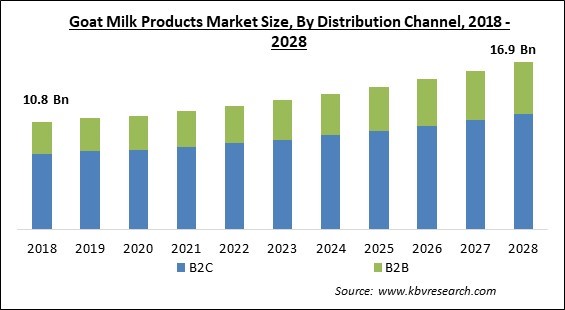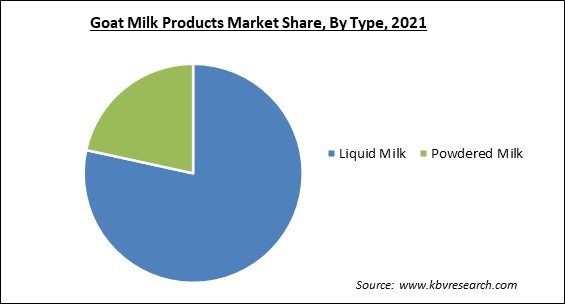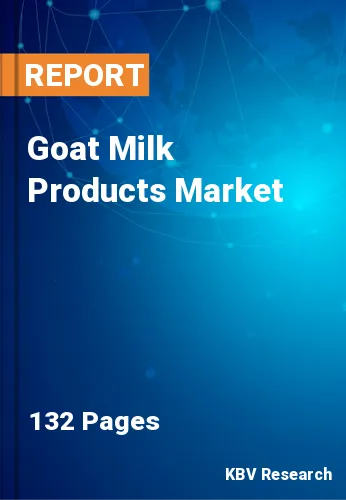The Global Goat Milk Products Market size is expected to reach $16.9 billion by 2028, rising at a market growth of 5.3% CAGR during the forecast period.
Goat milk is incredibly nutrient-dense, containing vitamins, minerals, protein, carbs, and fat. Goat milk is utilized in the same ways as cow's milk in producing butter, yogurt, cheese, ice cream, and other goods. The goat is among the most adaptable domestic animals in terms of adapting to arid & humid, tropical & cold, and desert & mountain conditions. It provides people with many valuable products, including meat, mohair, skins, leather, milk, cashmere, draught & pack power, as well as manure for gardens and crops. As a result, a growing number of individuals are becoming interested in goat milk as a valuable "super" dairy food item with unique medical, nutritional, immunological, and biological properties. It also serves as a means of sustenance for underprivileged rural populations with limited landholdings.

The numerous health advantages of goat milk, including its ability to promote healthy weight gain, ease digestion, boost platelet count, avoid insulin resistance, and lower cholesterol levels, and have led to a surge in its consumption in recent years. In addition, A2 casein is present in significant amounts in goat milk. A2 casein aids in the management of inflammatory illnesses like irritable bowel syndrome due to its high protein content, similar to human breast milk. Goat milk is frequently given to infants as their first source of protein after breastfeeding. Compared to cow's milk, goat milk makes them less susceptible to allergies. The producer sells goat milk cheese alone or in combination with other goods.
Goat milk cheese has seen a sharp rise in popularity in recent years. Because of their susceptibility to allergic reactions to items made from cow's milk, children and the elderly find it particularly appealing. Moreover, cheese prepared from goat's milk contains a variety of beneficial fats, including fatty acids, medium-chain triglycerides, and short- and medium-chain unsaturated fats. The cheese also contains high-quality, easily absorbed protein that provides the essential amino acids the human body needs. Goat cheese has fewer allergens, and it also supports a healthy gut in addition to reducing inflammation.
Globally, the COVID-19 pandemic had a substantial impact on several businesses. The outbreak only slightly impacted the goat milk products market. As a result, there was price volatility for raw materials, a goat feed shortage, and pandemic limitations that disrupted the supply chain, along with a greater reliance on e-commerce channels that had a negative impact on the industry. The economic effects of the pandemic had a detrimental effect on the price of goat milk during the lockdown and post-lockdown months.
In recent years, numerous experiments and trials have taken place to increase goats' milk output. A promising method that has been in use is genetic selection and breeding. Dairy goats have undergone genetic selection, which has boosted production and lengthened lactation. Due to their high genetic prospects for milk production, the specialist dairy goat breeds employed in high-income countries have been transported to many underdeveloped nations via live animal transport and exports of frozen embryos or semen. To increase milk production, these foreign goats were crossed with regional breeds. Such efforts will increase the dependence on goat milk for various products, which in turn, accelerates the expansion of the goat milk products market.
The expansion of the demand for goat milk products in recent years is anticipated to be fueled by a rise in the number of health-conscious people. Because goat milk offers similar nutritional qualities to human milk, there is an upsurge in demand for it across the board, helping the goat milk industry grow internationally. In addition, the health advantages of goat milk also fuel the industry's growth. For example, infants may easily digest this milk, which is high in calcium and fatty acids. Moreover, goat milk has a reduced cholesterol content. Many health benefits are associated with goat milk. Most of the goat milk produced is used for direct human consumption, followed by manufacturing milk powder, cheese, and other goods. Also, as people age, their bodies produce less stomach acid. Furthermore, goat milk has a lot of beneficial bacteria and microorganisms that help with digestion and stop constipation as well as other intestinal pains. Therefore, the numerous health benefits of goat and goat milk products propel the market's growth in the coming years.

A specialty item made from goat milk, goat milk powder often costs roughly twice as much as cow milk. Goat milk production is less than that of other types of dairy milk since it is more challenging to manufacture on a large scale. The increased expense of producing goat milk is the cause of the higher price. As a result, fewer farmers manufacture goat milk than cow milk, even though dairy goats are simpler to raise and more economical than dairy cows. The high labor costs needed are also a prominent cause of the world's inferior goat milk productivity. Therefore, the high prices associated with producing goat milk and products are the primary factors hampering the market's growth.
Based on type, the goat milk products market is categorized into liquid milk and powdered milk. The powdered milk segment procured a considerable growth rate in the goat milk products market in 2021. Since it has a lengthy shelf life, powdered goat milk has become increasingly popular in recent years, aiding in the segment's expansion. This was particularly true during the pandemic. Numerous people chose powdered milk because it was simpler to stock up on for extended periods during a fresh milk shortage.
On the basis of distribution channel, the goat milk products market is divided into B2B and B2C. The B2C segment acquired the largest revenue share in the goat milk products market in 2021. B2B consists of the selling of liquid milk and milk powder made from goats to companies that make finished goods. The producers then create a variety of goods, including yogurt, butter, cheese, and flavored milk. Due to the rising demand for chevre cheese and baby formula, the segment is anticipated to develop strongly over the projection period. Producers of goat milk favor distributing their goods via neighborhood markets. For long-distance sales inside the state and neighboring states, B2B distribution methods are recommended.
| Report Attribute | Details |
|---|---|
| Market size value in 2021 | USD 11.9 Billion |
| Market size forecast in 2028 | USD 16.9 Billion |
| Base Year | 2021 |
| Historical Period | 2018 to 2020 |
| Forecast Period | 2022 to 2028 |
| Revenue Growth Rate | CAGR of 5.3% from 2022 to 2028 |
| Number of Pages | 132 |
| Number of Table | 240 |
| Report coverage | Market Trends, Revenue Estimation and Forecast, Segmentation Analysis, Regional and Country Breakdown, Companies Strategic Developments, Company Profiling |
| Segments covered | Distribution Channel, Type, Region |
| Country scope | US, Canada, Mexico, Germany, UK, France, Russia, Spain, Italy, China, Japan, India, South Korea, Singapore, Malaysia, Brazil, Argentina, UAE, Saudi Arabia, South Africa, Nigeria |
| Growth Drivers |
|
| Restraints |
|
Based on region, the goat milk products market is analyzed across North America, Europe, Asia Pacific, and LAMEA. The Asia Pacific segment witnessed the maximum revenue share in the goat milk products market in 2021. The world's biggest producers and consumers of goat milk are India, Bangladesh, Pakistan, and China. India leads production and consumption with over 25% of the world's output. According to NCBI, the Asia Pacific region contains 60% of the world's goat population. While consumers are becoming more aware of the advantages of milk and other dairy products for their health, the consumption of dairy products is still rising significantly in the region.
Free Valuable Insights: Global Goat Milk Products Market size to reach USD 16.9 Billion by 2028
The market research report covers the analysis of key stake holders of the market. Key companies profiled in the report include Ausnutria Dairy Corporation Ltd. (Yili Group), Emmi Schweiz AG (Cooperative Central Switzerland Milk Producers ZMP), Goat Partners International Inc. (UNICA Global), Holle baby food AG, St Helen’s Farm Ltd. (The Kavli Group), Hewitt’s Dairy (Gay Lea Foods Co-operative Ltd.), Woolwich Dairy, Inc. (Saputo Inc.), HiPP GmbH & Co. Vertrieb KG, Courtyard Farms, and Granarolo S.p.A.
By Type
By Distribution Channel
By Geography
The global Goat Milk Products Market size is expected to reach $16.9 billion by 2028.
Growing efforts to increase the yield through methods like crossbreeding are driving the market in coming years, however, High prices of goat milk and goat milk products like milk powder restraints the growth of the market.
Ausnutria Dairy Corporation Ltd. (Yili Group), Emmi Schweiz AG (Cooperative Central Switzerland Milk Producers ZMP), Goat Partners International Inc. (UNICA Global), Holle baby food AG, St Helen’s Farm Ltd. (The Kavli Group), Hewitt’s Dairy (Gay Lea Foods Co-operative Ltd.), Woolwich Dairy, Inc. (Saputo Inc.), HiPP GmbH & Co. Vertrieb KG, Courtyard Farms, and Granarolo S.p.A.
The Liquid Milk market acquired the maximum revenue share in the Global Goat Milk Products Market by Type in 2021, thereby, achieving a market value of $13 billion by 2028.
The B2B market has shown the high growth rate of 5.9% during (2022 - 2028). Goat milk products are sold to consumers directly through the B2C channel.
The Asia Pacific market dominated the Global Goat Milk Products Market by Region in 2021, and would continue to be a dominant market till 2028; thereby, achieving a market value of $8.5 billion by 2028.
Our team of dedicated experts can provide you with attractive expansion opportunities for your business.

